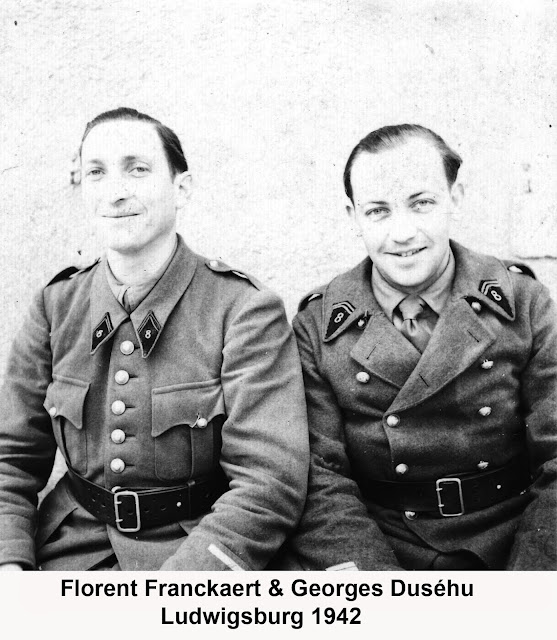L’attente des lettres et des colis était, si
ce n’est une obsession, tout du moins une préoccupation quasi journalière pour
les prisonniers. Encore fallait-il suivre les procédures que les Allemands
appliquèrent en 1941 pour que le colis parvienne bien au prisonnier. Ma mère
qui aimait par-dessus tout n’en faire qu’à sa tête, avait tendance à ne pas
toujours suivre ces directives rigides, et mon père dans quasiment toutes les
lettres à cette époque lui donnait des instructions pour qu’elle écrive bien à
l’extérieur du colis en en faisant l'inventaire, dans les termes et la forme
voulus. Lorsque les colis arrivaient, leur contenu de nourriture était mis en
commun afin d’agrémenter l’ordinaire des camarades du kommando, permettant
surtout le dimanche de faire un vrai repas à la Française pour tous ces hommes
privés depuis si longtemps de patrie. Car en plus d’être un lien avec la
France, le colis leur apportait concrètement un peu du pays, qu’ils devaient
tous avoir à fleur de peau, et les plus simples choses qui en venaient étaient
magnifiées. Mon père évoquait, là le cake qui avait régalé tous ses compagnons,
là les truffes au chocolat dont ils avaient apprécié chaque bouchée, ou encore
le lapin en conserve qu’ils avaient mariés avec les légumes d’un autre
prisonnier afin d’en faire un vrai repas dominical. Dans ce kommando, mon père
était bien fourni en victuailles (grâce à sa belle-mère qui avait une
boulangerie et souffrait moins de la pénurie que d’autres Français). Florent,
un autre camarade de régiment, boucher de son état dans le civil, et qui fut
libéré avant mon père, dont les colis étaient aussi bien fournis, apportait de
même aux prisonniers du kommando sa part de bienfaits et de plaisir, chacun
prenant part à la confection du repas qui leur donnait alors un peu l’illusion
d’être là-bas, loin des barbelés, loin de leurs souffrances, pour quelques
instants redevenus eux-mêmes.
Waiting for letters and
parcels was, if not an obsession, at least an almost daily concern for
prisoners. It was still necessary to follow the procedures that the Germans
applied in 1941 to ensure that the package reached the prisoner. My mother, who
liked above all to do as she pleased, tended not to always follow these rigid
instructions, and my father in almost every letter at that time gave her
instructions to write well outside the package, taking inventory of it, in the
terms and form the German wanted. When the packages arrived, their food content
was pooled to decorate the ordinary comrades of the kommando, allowing
especially on Sundays to make a real French-style meal for all these men who
had been deprived of their homeland for so long. Because in addition to being a
link with France, the parcel brought them a little bit of the country, which
they must all have had on their skin, and the simplest things that came from it
were magnified. My father would talk about the cake that had delighted all his
companions, the chocolate truffles that they enjoyed every bite, or the canned
rabbit that they had married with another prisoner's vegetables to make a real
Sunday meal. In this kommando, my father was well supplied with food (thanks to
his mother-in-law who had a bakery and suffered less from the shortage than
other French people). Florent, another regimental comrade, a butcher of his
civilian status, who was released before my father, whose packages were also
well provided, also brought his share of benefits and pleasure to the prisoners
of the kommando, each taking part in the preparation of the meal, which gave
them the illusion of being there, far from the barbed wire, far from their
sufferings, for a few moments to become themselves again.




Aucun commentaire:
Enregistrer un commentaire
Si vous désirez la version numérique du livre Stalag VA merci de laisser votre adresse mail à: b.dusehu.becker@gmail.com
Als u de digitale versie van het boek Stalag VA wilt ontvangen, kunt u uw emailadres achterlaten op: b.dusehu.becker@gmail.com
If you would like the digital version of the book Stalag VA please leave your email address at: b.dusehu.becker@gmail.com